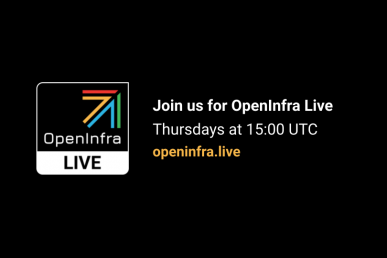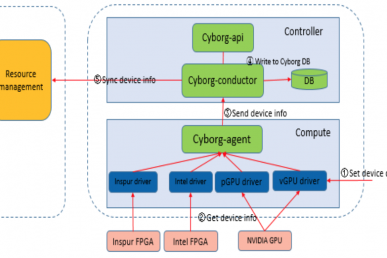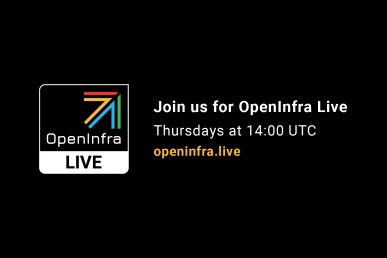This post is part of the Women of Open Infrastructure series to spotlighting the women in various roles in the community who have helped make the Open Infrastructure successful. With each post, we learn more about each woman’s involvement in the community and how they see the future of Open Infrastructure taking shape. If you’re interested in being featured or would like to nominate someone to tell their stories, please email [email protected].
This time we’re talking to Yumeng Bao from the OpenStack Cyborg Project. She tells Superuser about how the Open Infrastructure community has helped her to grow and excel at her role in the community.
What’s your role(s) in the Open Infrastructure community?
I currently serve as the OpenStack Cyborg Project Team Lead (PTL) for the Victoria Release Cycle, which is a new challenge for me. Before this role, all of my mind was on the code as a core reviewer, such as feature development, code enhancement, bug issue fix, patch review, and etc. While in the new role of being a PTL, I also need to think about the people, organizations, and cross-project collaboration.
What obstacles do you think women face when getting involved in the Open Infrastructure community?
For women, I think that it’s not easy to be different in a male-dominated community, and, inevitably, people have many stereotypes, which are leftover from the development of the society. Limited by the stereotypes, women are more likely to take the so-called “safe” or “easy” tasks, with the fear of making mistakes. However, we all make mistakes. You might see it as a mistake, while others see it as your engagement.
Stereotypes may take generations to break. In this open source community, we, as contributors, can do our best to build a better community with fewer stereotypes, more open minds, and encouragement for the rise of women’s power. What I think is most important to women is that we shouldn’t allow the fear of failure to stop you from taking challenges.
Why do you think it’s important for women to get involved with open source?
Because that’s a win-win choice! Open source needs women’s potential to grow with the open source community. Some people might believe that men have an advantage of pioneering and innovating, and women have a natural advantage of handling details and aspiring perfection. The development of open source projects is always inseparable from these two stages: founding and further perfection, in which women can harness and mold the unique female strengths to their advantage.
For women ourselves, contributing in open source community is an opportunity to gain professional experiences in developing such a great project, to stay updated with leading technology and great framework design patterns, to learn from peers and experts from different countries, companies and with different genders, ages, and races.
Efforts have been made to get women involved in open source, what are some initiatives that have worked, and why?
Trust and support!
When facing challenges, people tend to strive to overcome difficulties when they believe they can do, but hesitate when they lack confidence. Same for women. Trust, either self-trust or trust from others, is a magic power to inspire someone to take difficult challenges. Whatsmore, providing appropriate support where necessary is also important to encourage new contributors, especially, to get involved. OpenStack Outreachy, Docs, IRC channels, and mailing lists (ML) are proved to be a great start for new contributors to get involved. However, I’ve noticed that not all upstream developers/projects attach the supportive documentation. We can do more to maintain the high priority of supportive materials.
Open source moves very quickly. How do you stay on top of things and what resources have been important for you during this process?
As you know, that’s impossible for sure to catch up with everything, but it is possible to stay on top of things in the scope of your priorities in a period of time. For me, the most important strategy is synchronization with community leaders and those within reach! Within the period of a release cycle, I usually have some goals or topics with high priorities. Once the goals are determined, I regularly follow the ML threads with related tags, star and track correlative patches in Gerrit, and find clues in the meeting agenda of related projects. Once I’m done with all the above research, I can easily find who the people are on top. Then bring my questions and initiatives, directly, and talk to them! The only disadvantage is that we might be in different time zones, but hey, no worries! Our community has a lot of good remote collaboration tools, and I think you can finally find one that perfectly matches your needs.
What advice would you give to a woman considering a career in open source? What do you wish you had known?
For me, I feel that it’s well worth taking the open source upstream developer role as my career’s starting point, especially in the Open Infrastructure community. It is a good opportunity to gain career experiences in many areas such as technical experience in distributed cloud technology, cross-culture collaboration with excellent engineers from all over the world to solve common problems in real production, and witness the evolution of such an influential technology as one of the contributors. I joined the community after my college graduation in 2016. If I had known cloud computing and open source models earlier, I think I would give it a try sooner and probably catch its early evolution period. Therefore, if a woman is considering a career in the open source, I would recommend that just go ahead and try! Open source has the natural advantage that you can start as a volunteer without the need to assign any long-time contracts. I’m sure you won’t regret whatever you’ve tried in the Open Infrastructure community!
- Demystifying Confidential Containers with a Live Kata Containers Demo - July 13, 2023
- OpenInfra Summit Vancouver Recap: 50 things You Need to Know - June 16, 2023
- Congratulations to the 2023 Superuser Awards Winner: Bloomberg - June 13, 2023

)










